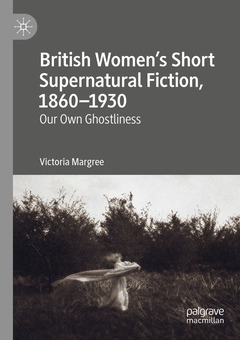Description
British Women’s Short Supernatural Fiction, 1860–1930, 1st ed. 2019
Our Own Ghostliness
Author: Margree Victoria
Language: English
Keywords
Gothic; Victorian; Supernatural; Women's writing; Gender; Fantastic; Gothic fiction
British Women's Short Supernatural Fiction, 1860-1930
Publication date: 11-2020
203 p. · 14.8x21 cm · Paperback
Publication date: 11-2020
203 p. · 14.8x21 cm · Paperback
British Women's Short Supernatural Fiction, 1860-1930
Publication date: 11-2019
Support: Print on demand
Publication date: 11-2019
Support: Print on demand
Description
/li>Contents
/li>Biography
/li>Comment
/li>
This book explores women?s short supernatural fiction between the emergence of first wave feminism and the post-suffrage period, arguing that while literary ghosts enabled an interrogation of women?s changing circumstances, ghosts could have both subversive and conservative implications. Haunted house narratives by Charlotte Riddell and Margaret Oliphant become troubled by uncanny reminders of the origins of middle-class wealth in domestic and foreign exploitation. Corpse-like revenants are deployed in Female Gothic tales by Mary Elizabeth Braddon and Edith Nesbit to interrogate masculine aestheticisation of female death. In the culturally-hybrid supernaturalism of Alice Perrin, the ?Marriage Question? migrates to colonial India, and psychoanalytically-informed stories by May Sinclair, Eleanor Scott and Violet Hunt explore just how far gender relations have really progressed in the post-First World War period. Study of the woman?s short story productively problematises literary histories about the ?golden age? of the ghost story, and about the transition from Victorianism to modernism.
Introduction: Our Own Ghostliness.- (Other)Worldly Goods: Ghost Fiction as Financial Writing in Margaret Oliphant and Charlotte Riddell.-Neither Punishment nor Poetry: Mary Elizabeth Braddon, Edith Nesbit and Female Death.- The Good Memsahib? Marriage, Infidelity and Empire in Alice Perrin’s Anglo-Indian Tales.- Haunted Modernity in the Uncanny Stories of May Sinclair, Eleanor Scott and Violet Hunt .- Conclusion.
Victoria Margree is Principal Lecturer in the Humanities, and Academic Programme Leader for the Humanities Programme at the University of Brighton, UK.
Makes an original contribution to ghost story scholarship by arguing for an intersectional approach to women’s supernatural short fiction of the late-Victorian period and early twentieth century Argues for caution in relation to a scholarly tendency to read women’s ghost fiction for subversive meanings, emphasising the equivocal or even conservative messages that such texts also often endorse Expands the canon of ghost story writers and women writers Draws upon a range of theoretical perspectives including New Economic Criticism, postcolonial theory and psychoanalytic theory Reads the short supernatural story in relation to contexts including the women’s movement, the Marriage Question, economic crises, Britain’s changing class structure, colonialism and ideas about ‘race’, aesthetic movements, and the First World War Contributes to the current resurgence of scholarship on short fiction and short fiction theory, and to the ever-expanding fields of study of Gothic and Victorian supernaturalism Contributes to recent scholarship that seeks to identify previously obscured connections between Victorian literary culture and twentieth century modernism
© 2024 LAVOISIER S.A.S.




